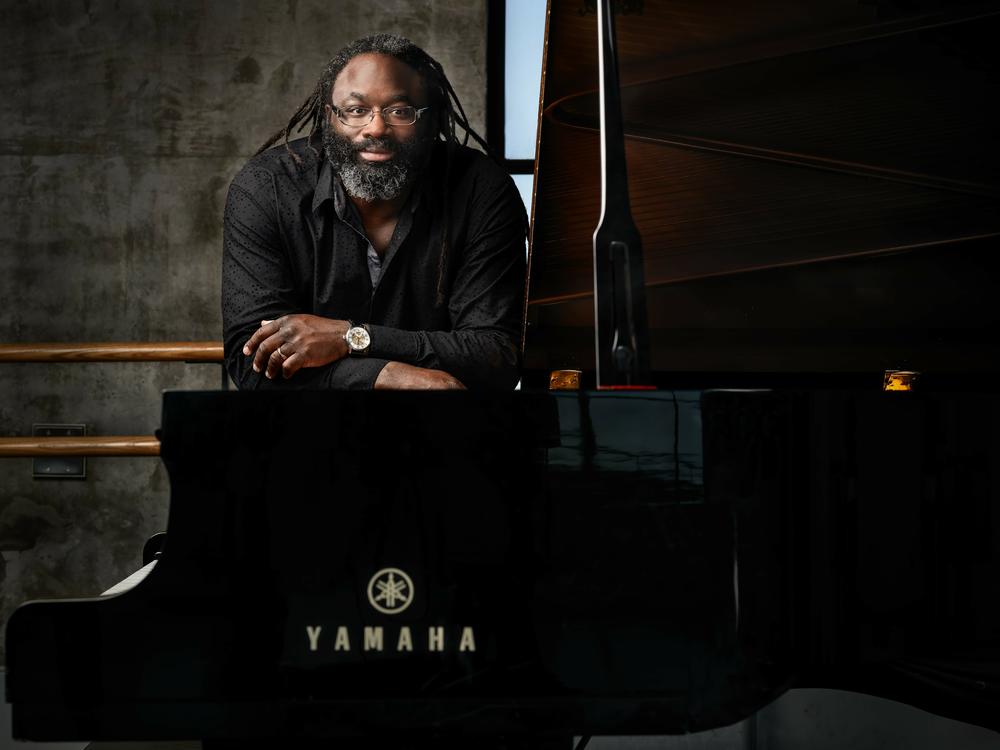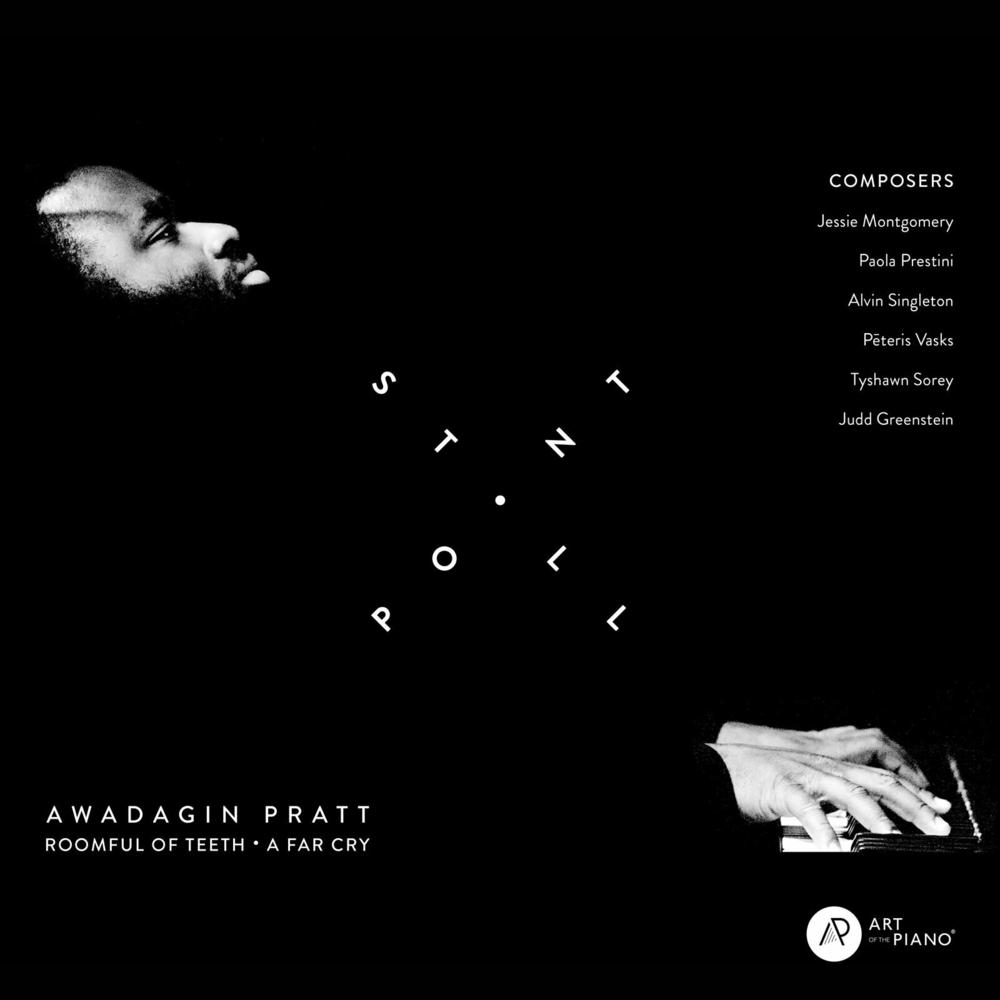Rounds from Art of the Piano on Vimeo.
Section Branding
Header Content
After 12 years, pianist Awadagin Pratt rediscovers his sweet spot
Heard on
Primary Content
Few words describe the pianist Awadagin Pratt better than "overachiever." The Pittsburgh native began racking up awards in the early 1990s, including first place in the Naumburg International Piano Competition (as the first Black artist to win the prize) and the lucrative Avery Fisher Career Grant. He signed with a marquee label, and made guest appearances at the likes of the Today Show, Good Morning America, Sesame Street and even the White House. He's also a triple threat, the first student in the history of Baltimore's Peabody Conservatory of Music to earn simultaneous degrees in piano, violin and conducting. But for all the ground he's covered, there's one place Pratt has been conspicuously absent from lately — the recording studio.
Now, at 57, poised to begin a new professorship at the San Francisco Conservatory of Music, Pratt has just released his first album in 12 years, STILLPOINT. Rather than merely pop into a studio to record a few warhorse favorites, the pianist devoted five years of careful thought to the release, commissioning new pieces from six composers.
In the album's liner notes, Pratt points to one of his favorite poems, T.S. Eliot's "Burnt Norton," as his inspiration for creating a body of work about "seemingly diametrically opposed energies" and the struggle to balance those opposing forces in everyday life. As his musical partners, Pratt tapped the agile, finely honed string orchestra A Far Cry and the experimental vocal group Roomful of Teeth. The result isn't merely worth the wait; it is perhaps the finest album of his career.
Pratt handed each of his composers some lines from Eliot's poem as a jumping-off point. Jessie Montgomery's Rounds, which opens the album, already has a life of its own — Pratt has performed the work with 30 orchestras since he debuted it in the spring of 2022, a rare feat of visibility for such a new piece. Montgomery's music amounts to a miniature piano concerto that plays with opposites, deploying new harmonies within old structures. That structure allows Pratt an improvised cadenza where, in one passage, he literally leans into the piano to pluck notes.
The album's title is a motif in Eliot's poem, where references to "the still point of the turning world" conjure spaces that are both immense and precise. Composer Tyshawn Sorey distills that idea into something untethered in Untitled Composition for Piano and Eight Voices. The wispy vocals of Roomful of Teeth and Pratt's lonely tolling piano call to mind the vast, quiet spaces of Morton Feldman and the featherlight ambience of Brian Eno.
Paola Prestini takes the T.S. Eliot prompt one step further, digging into love letters the poet wrote to a schoolteacher. Ultimately, Eliot denied his feelings, but Prestini's Code explores the unknowable cusp between avowal and denial. Bookended by bird calls — uncanny vocalizations by Teeth singers — the music unfolds in episodes and, near the end, bursts open with a rapturous confluence of strings, voices and Pratt's piano, searching for what Prestini calls the "great moments of self-clarity."
It was after having one of those epiphanies himself that Pratt created his multimedia project Black in America, forged from the isolation of the pandemic and unrest over the murder of George Floyd. He's brought the presentation to university music schools across the country, weaving images from the civil rights movement and his own experiences with racial profiling into the performances. Another piece Pratt has been touring recently lies at the center of the new album — it's a solo piano work by the Latvian composer Pēteris Vasks that illuminates the mysterious threshold where, in Eliot's poem, "past and future are gathered." Inspired by Teresa of Ávila, a 16th century nun, the piece reveals a kind of supercharged still point between spiritual and intellectual ecstasy. Pratt makes the music burn, both in its tranquil and agitated states.
Like Vasks, Alvin Singleton is an elder statesman. Now 82, the American composer once marveled at the young Pratt's prowess, hoping one day to hear the pianist play his music. Singleton's Time Past, Time Future toys with the elasticity of time — and styles of music. Jagged piano chords might recall either Thelonius Monk or Igor Stravinsky, while the two-voiced counterpoint reaches for Bach.
What attracted Pratt to Eliot's verse, he says, is "an acknowledgement of the inexpressible — that which cannot be tidily communicated." The final work on the album, by Judd Greenstein, seems to search for that ambiguous place. Still Point, another pint-sized piano concerto, is built from two chords that engender a wide color palette of emotion, alternating turbulent outbursts with quieter rippling passages and retro, pulsating voices straight out of Steve Reich's Music for 18 Musicians. In its final moment, Pratt is alone, right hand reaching for the highest note.
With this new album, perhaps Pratt has rediscovered the sweet spot he once enjoyed in the recording studio. STILLPOINT offers much to wrestle with – six distinct new pieces that, each in their own way, try to teach us how to balance contradictions in our lives, to find the still point. That makes for one endlessly engaging recording. Let's hope we don't have to wait 12 years for the next one.
Copyright 2023 NPR. To see more, visit https://www.npr.org.


